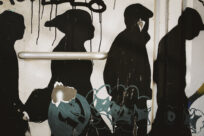“We debunked some myths about the boys in the parks of Athens”
UNHCR, the UN Refugee Agency, asked for your expert advice about survival sex of refugee and migrant boys in the parks of Athens, Greece. You went there. What did you encounter?
In the parks and on some squares you can see refugees and migrants living in poverty, you can see signs of unhealthy behaviours. While I have not seen the sexual acts, there was every possible sign hinting at this reality: boys hanging around by themselves between the trees, random older Greek men walking around very slowly without any obvious purpose. There is a particular energy about their movements approaching each other, to offer a smoke for example, to look into the eyes in a way as if they were offering or soliciting something. Most of the boys were very young!
There is the prejudice that this form of survival sex has to do with their culture. But what is really behind them exposing themselves to all these risks, to situations of violence?
Nearly anybody could spread these myths – from some media to NGO workers, from some of my friends to civil servants. The weirdest myth or prejudice I heard was that Afghan boys were dancing boys, used for sex by war lords. That this was normal for them. The boys certainly don’t do this because it is in their culture!
So what is the reality, based on your fact finding?
Some of the boys are homeless, they do it for food etc. , but the majority technically are not homeless. Their very basic survival needs are met, they have a roof in a government-run camp, shelter or squat where they get something to eat.
For them, too, at the surface it is the money, the 2 Euro, the 20 or 40 Euro they might get for unprotected sex. To have the nice jacket like other kids in the street, is only the trigger.
If you look deeper it is a difficult decision for a boy from Afghanistan or other places to have his first sexual experience this way. If we understand that it is so disgusting for them, that, in their culture, this is something sinful, demeaning, then there must be something beyond the money.
What is this something?
We can hear it in the language how they talk about it – there is a sense of humiliation. The act of survival sex resembles self-harm when the kids realize that it is so demeaning and humiliating. And if we look at self-harm in psychology, it is related to self-worth.
If you have been told all your life that you are worthless, why should you care about yourself? Many of the boys have been sent away by their parents, exploited, crossing countries for months. When everything in your life told you are not worth better, you may think you do not deserve better than doing things that humiliate you. Unaccompanied children do not have the protective environment of the family, there are no parents to tell them what is right or wrong.
So this something is all the hardship caused by the refugee experience and the system failure since they left home or even before. Despite all the efforts in assistance that are made, their situation is not very stable. One of the reasons young people are desperate in Greece is because they feel they are stuck. Young Syrians in the relocation programme (an EU scheme to distribute asylum-seekers of certain nationalities, including Syrians, but excluding Afghans, across Europe, editor’s note) know they will leave in a few weeks or months, so there is hope, they do not necessarily go and engage. Afghans and other nationalities feel they are seen as lesser than Syrians.
How many children are involved in survival sex?
Nobody has the number. But it looks as if the number of boys was growing, because they are becoming more desperate.
If you hear that someone has stopped doing this, it is because somebody gave them more support or some kind of love or caring. So you see it is not just about making money.
How did you get access to this reality? One cannot just go to these filthy and dark corners and ask people: Hey, what’s your story?…
For methodological and security reasons, I did not have a single chat in the park, where I saw also signs of drug consumption. I had conversations with boys in camps, squats and shelters, but also in social cafes or at an event. They told me that they have seen sexual acts or have been approached.
But you don’t openly start asking questions about this. It took a few encounters to build that confidence. They are in a desperate need of some familiarity. If you come from the same culture or language – I am from the Middle East -, it is easier for them to break down the boundary. You ask them about their real human experience, their story. When they see you want to know more than their biodata, they feel they mean something to you.
How did the authorities react when you shared these insights?
It was a very interesting conversation! UNHCR met with public prosecutors and members of the judiciary, representatives from different police departments and other authorities dealing with unaccompanied children. I think we debunked some myths about the boys in the parks as we helped them understand the cultural context, but also what the boys had gone through, the experience of being forcibly displaced, of armed conflict, of being unaccompanied and the impact this had on them. Once they made this connection, suddenly there was a firm commitment to get engaged, to increase their capacities, to adapt their methodology of and beyond law enforcement. For security forces, it is important to see the boys as victims rather than as trouble-makers.
With which result?
There was a formal announcement to work with UNHCR in a Task Force on unaccompanied children and sexual exploitation, comprised of different national authorities. UNHCR will initiate the process and support capacity building efforts to sensitize civil servants about the cultural context, which is so different from the myths.
- Suhail Abualsameed from Jordan is a consultant on Sexual and Gender-Based Violence (SGBV). Before the consultancy for UNHCR in Greece, he worked on prevention in the displacement context in Jordan and in refugee camps in Kenya.
-

Attack in Thessaloniki: yet another violent incident targeting people because of their identity
15 Mar 2024Athens 15.03.2024 – The Racist Violence Recording Network strongly condemns the violent incident against two LGBTQI+ individuals in Thessaloniki by a large group on Saturday 9 March 2024 and expresses its deep concern about the escalating homophobic and transphobic rhetoric targeting LGBTQI+ people and the impact it might have on […]
-

UNHCR concerned after protesters occupy Athens cash assistance centre
8 Aug 2018UNHCR, the UN Refugee Agency, regrets the forced interruption by protest action of its regular cash assistance programme in Athens and hopes to resume normal service once the safety and security of beneficiaries and staff is assured. Demonstrators had been blocking access to the Akominatou Street cash assistance centre, run […]
-

Stronger cooperation crucial to ensure sustainable refugee response in Greece – UNHCR
27 Mar 2017UNHCR, the UN Refugee Agency, said today that joint efforts and strengthened cooperation are crucial to improving the situation for asylum-seekers and refugees in Greece and issued eight recommendations* to help ensure a sustainable refugee response in the country. “UNHCR is fully engaged in finding lasting solutions in Greece together […]
-

Special Envoy Angelina Jolie renews UNHCR contract, says ‘I’m with you for life’
16 Mar 2017GENEVA – Special Envoy Angelina Jolie today reaffirmed her commitment to refugees worldwide, telling staff at UNHCR, the UN Refugee Agency: “I am with you for life.” Jolie visited UNHCR headquarters during a one-day trip to Geneva, speaking to hundreds of staff members assembled in the atrium. “This is like […]
